Module 3 Sports. 复习学案(无答案)
文档属性
| 名称 | Module 3 Sports. 复习学案(无答案) |
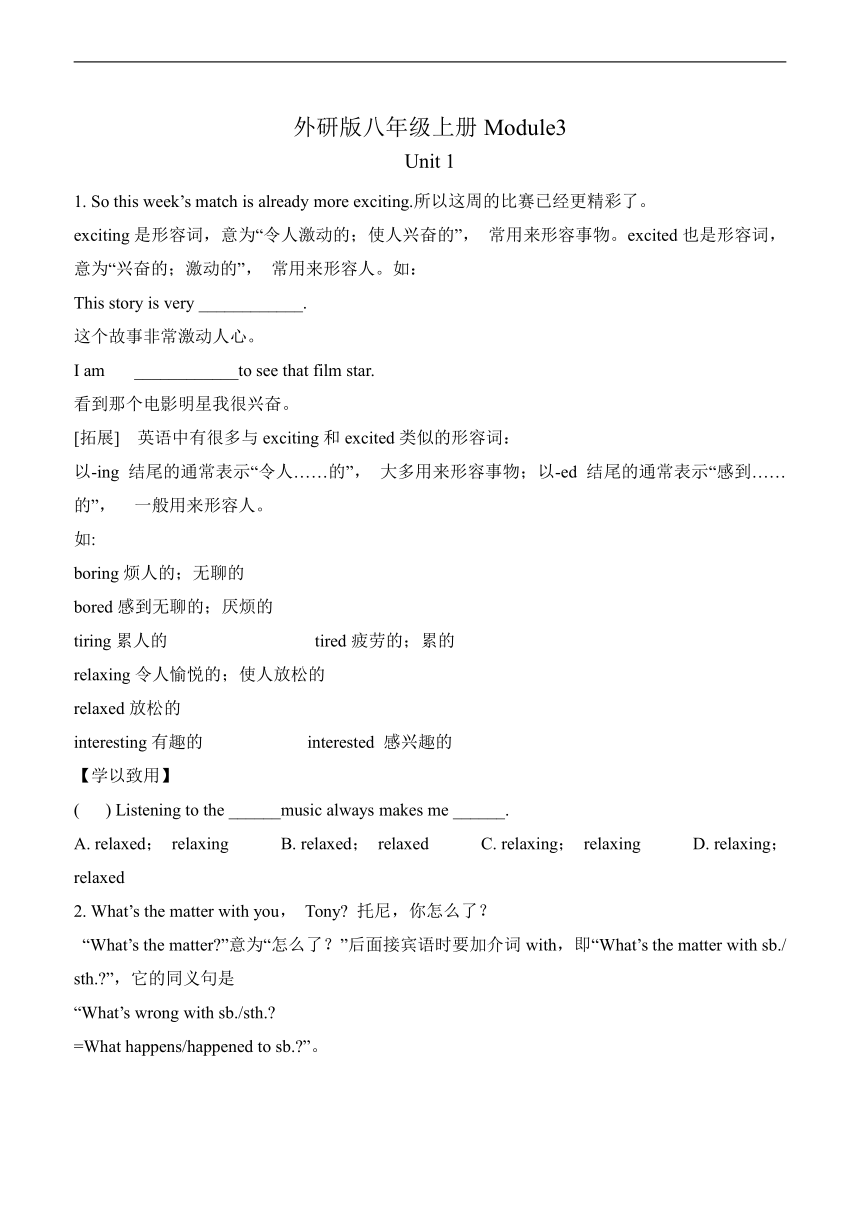
|
|
| 格式 | docx | ||
| 文件大小 | 35.0KB | ||
| 资源类型 | 教案 | ||
| 版本资源 | 外研版 | ||
| 科目 | 英语 | ||
| 更新时间 | 2024-07-25 00:00:00 | ||
图片预览

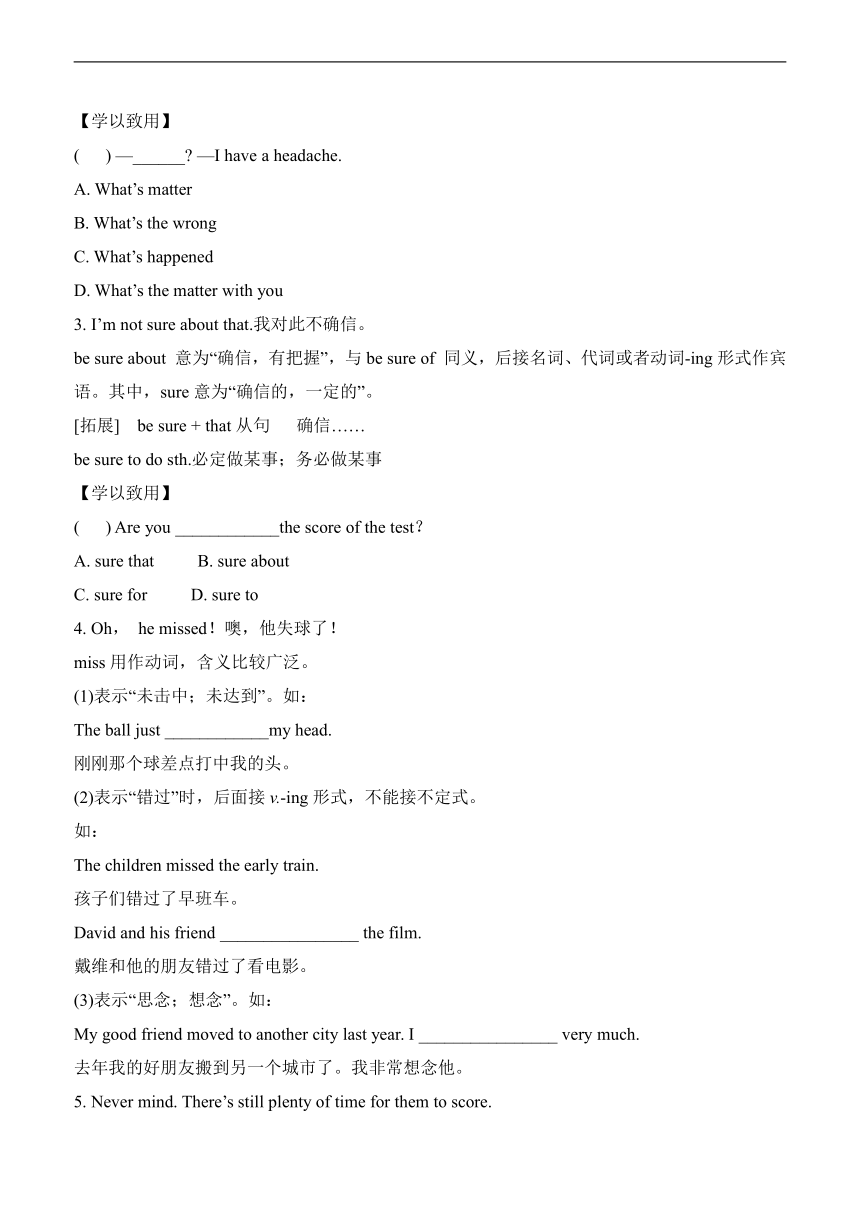
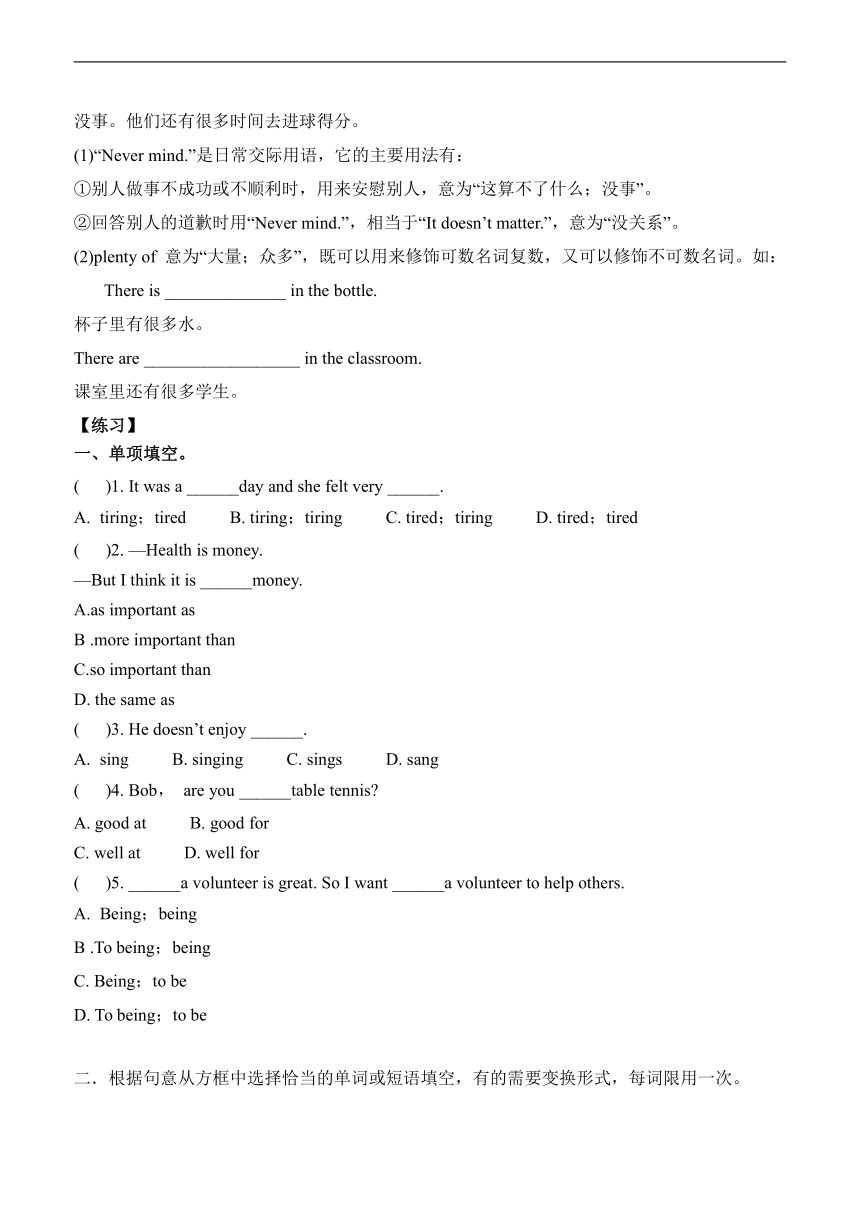
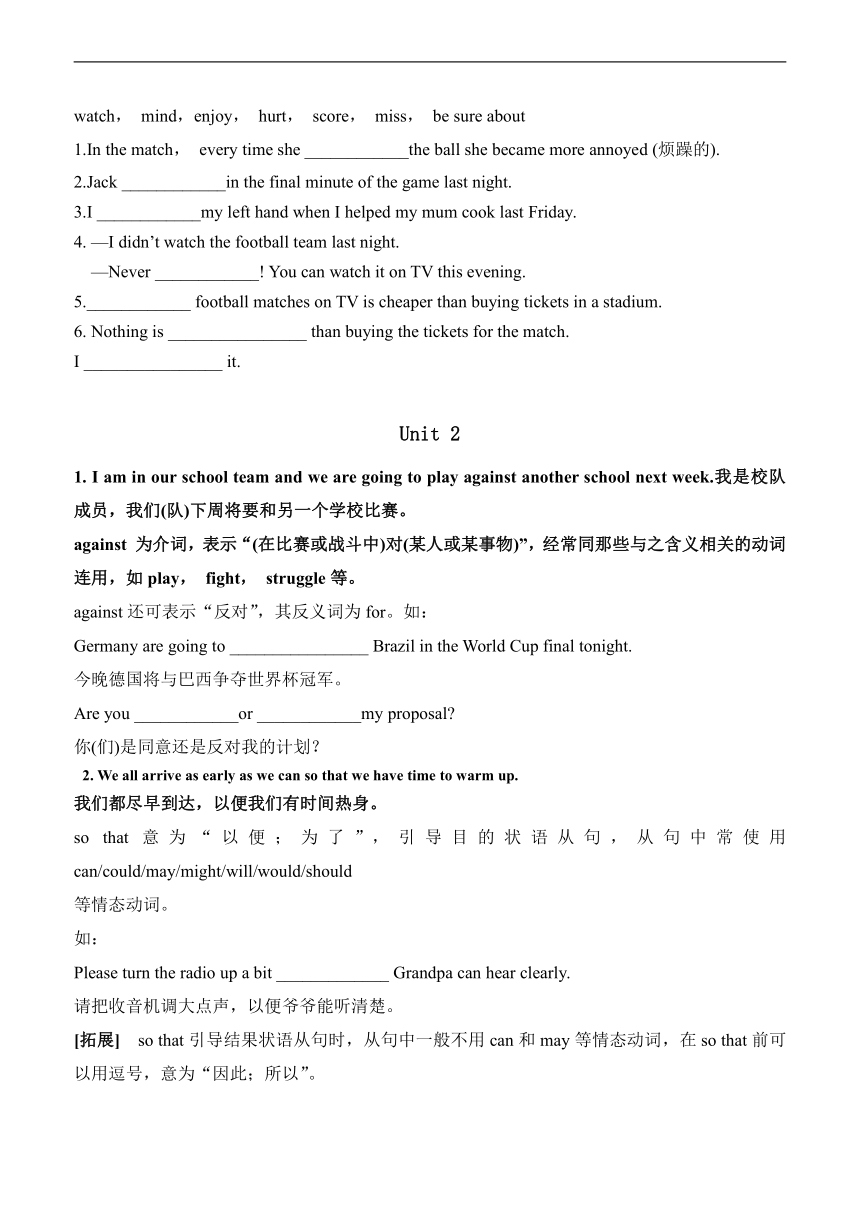
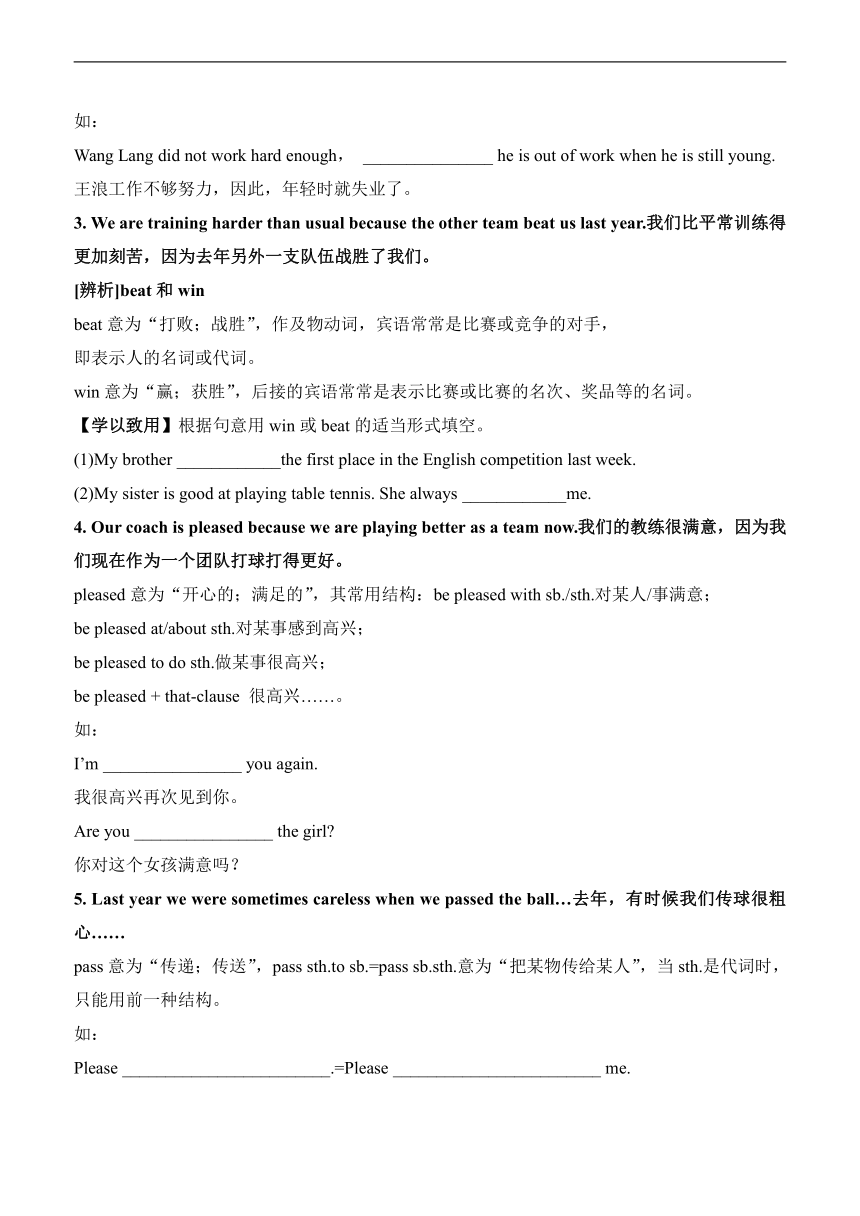
文档简介
外研版八年级上册Module3
Unit 1
1. So this week’s match is already more exciting.所以这周的比赛已经更精彩了。
exciting是形容词,意为“令人激动的;使人兴奋的”, 常用来形容事物。excited也是形容词,意为“兴奋的;激动的”, 常用来形容人。如:
This story is very ____________.
这个故事非常激动人心。
I am ____________to see that film star.
看到那个电影明星我很兴奋。
[拓展] 英语中有很多与exciting和excited类似的形容词:
以-ing 结尾的通常表示“令人……的”, 大多用来形容事物;以-ed 结尾的通常表示“感到……的”, 一般用来形容人。
如:
boring烦人的;无聊的
bored感到无聊的;厌烦的
tiring累人的 tired疲劳的;累的
relaxing令人愉悦的;使人放松的
relaxed放松的
interesting有趣的 interested 感兴趣的
【学以致用】
( ) Listening to the ______music always makes me ______.
A. relaxed; relaxing B. relaxed; relaxed C. relaxing; relaxing D. relaxing; relaxed
2. What’s the matter with you, Tony 托尼,你怎么了?
“What’s the matter ”意为“怎么了?”后面接宾语时要加介词with,即“What’s the matter with sb./ sth. ”,它的同义句是
“What’s wrong with sb./sth.
=What happens/happened to sb. ”。
【学以致用】
( ) —______ —I have a headache.
A. What’s matter
B. What’s the wrong
C. What’s happened
D. What’s the matter with you
3. I’m not sure about that.我对此不确信。
be sure about 意为“确信,有把握”,与be sure of 同义,后接名词、代词或者动词-ing形式作宾语。其中,sure意为“确信的,一定的”。
[拓展] be sure + that从句 确信……
be sure to do sth.必定做某事;务必做某事
【学以致用】
( ) Are you ____________the score of the test?
A. sure that B. sure about
C. sure for D. sure to
4. Oh, he missed!噢,他失球了!
miss用作动词,含义比较广泛。
(1)表示“未击中;未达到”。如:
The ball just ____________my head.
刚刚那个球差点打中我的头。
(2)表示“错过”时,后面接v.-ing形式,不能接不定式。
如:
The children missed the early train.
孩子们错过了早班车。
David and his friend ________________ the film.
戴维和他的朋友错过了看电影。
(3)表示“思念;想念”。如:
My good friend moved to another city last year. I ________________ very much.
去年我的好朋友搬到另一个城市了。我非常想念他。
5. Never mind. There’s still plenty of time for them to score.
没事。他们还有很多时间去进球得分。
(1)“Never mind.”是日常交际用语,它的主要用法有:
①别人做事不成功或不顺利时,用来安慰别人,意为“这算不了什么;没事”。
②回答别人的道歉时用“Never mind.”,相当于“It doesn’t matter.”,意为“没关系”。
(2)plenty of 意为“大量;众多”,既可以用来修饰可数名词复数,又可以修饰不可数名词。如: There is ______________ in the bottle.
杯子里有很多水。
There are __________________ in the classroom.
课室里还有很多学生。
【练习】
一、单项填空。
( )1. It was a ______day and she felt very ______.
tiring;tired B. tiring;tiring C. tired;tiring D. tired;tired
( )2. —Health is money.
—But I think it is ______money.
A.as important as
B .more important than
C.so important than
D. the same as
( )3. He doesn’t enjoy ______.
sing B. singing C. sings D. sang
( )4. Bob, are you ______table tennis
A. good at B. good for
C. well at D. well for
( )5. ______a volunteer is great. So I want ______a volunteer to help others.
Being;being
B .To being;being
C. Being;to be
D. To being;to be
二.根据句意从方框中选择恰当的单词或短语填空,有的需要变换形式,每词限用一次。
watch, mind,enjoy, hurt, score, miss, be sure about
1.In the match, every time she ____________the ball she became more annoyed (烦躁的).
2.Jack ____________in the final minute of the game last night.
3.I ____________my left hand when I helped my mum cook last Friday.
4. —I didn’t watch the football team last night.
—Never ____________! You can watch it on TV this evening.
5.____________ football matches on TV is cheaper than buying tickets in a stadium.
6. Nothing is ________________ than buying the tickets for the match.
I ________________ it.
Unit 2
1. I am in our school team and we are going to play against another school next week.我是校队成员,我们(队)下周将要和另一个学校比赛。
against 为介词,表示“(在比赛或战斗中)对(某人或某事物)”,经常同那些与之含义相关的动词连用,如play, fight, struggle等。
against还可表示“反对”,其反义词为for。如:
Germany are going to ________________ Brazil in the World Cup final tonight.
今晚德国将与巴西争夺世界杯冠军。
Are you ____________or ____________my proposal
你(们)是同意还是反对我的计划?
2. We all arrive as early as we can so that we have time to warm up.
我们都尽早到达,以便我们有时间热身。
so that意为“以便;为了”,引导目的状语从句,从句中常使用can/could/may/might/will/would/should
等情态动词。
如:
Please turn the radio up a bit _____________ Grandpa can hear clearly.
请把收音机调大点声,以便爷爷能听清楚。
[拓展] so that引导结果状语从句时,从句中一般不用can和may等情态动词,在so that前可以用逗号,意为“因此;所以”。
如:
Wang Lang did not work hard enough, _______________ he is out of work when he is still young.
王浪工作不够努力,因此,年轻时就失业了。
3. We are training harder than usual because the other team beat us last year.我们比平常训练得更加刻苦,因为去年另外一支队伍战胜了我们。
[辨析]beat和win
beat意为“打败;战胜”,作及物动词,宾语常常是比赛或竞争的对手,
即表示人的名词或代词。
win意为“赢;获胜”,后接的宾语常常是表示比赛或比赛的名次、奖品等的名词。
【学以致用】根据句意用win或beat的适当形式填空。
(1)My brother ____________the first place in the English competition last week.
(2)My sister is good at playing table tennis. She always ____________me.
4. Our coach is pleased because we are playing better as a team now.我们的教练很满意,因为我们现在作为一个团队打球打得更好。
pleased意为“开心的;满足的”,其常用结构:be pleased with sb./sth.对某人/事满意;
be pleased at/about sth.对某事感到高兴;
be pleased to do sth.做某事很高兴;
be pleased + that-clause 很高兴……。
如:
I’m ________________ you again.
我很高兴再次见到你。
Are you ________________ the girl
你对这个女孩满意吗?
5. Last year we were sometimes careless when we passed the ball…去年,有时候我们传球很粗心……
pass意为“传递;传送”,pass sth.to sb.=pass sb.sth.意为“把某物传给某人”,当sth.是代词时,只能用前一种结构。
如:
Please ________________________.=Please ________________________ me.
请把那支钢笔递给我。
Please ________________________.
6. That means we have a better chance of winning.那就意味着我们获胜的机会更大。
have a chance of doing sth.=have a chance to do sth.意为“有机会做某事”。如:
I ______________________ to Beijing.=I _______________________to Beijing.
我有去北京的机会。
【练习】
一、根据中文意思或首字母提示,用单词的适当形式填空。
1.Our school volleyball team will play a ____________your school team next week.
2.I get up at 6:30 and go to school at 7:00 as u____________.
3.This is our football ____________(教练).
4.You should do more after-school ____________(练习) if you want to win the match.
5.She was so____________(粗心的) that she made several spelling mistakes.
二、完成句子,词数不限。
1. 明天我们应该尽可能早到学校。
We should arrive at school ___________________________ tomorrow.
2. 我们班的学生有获胜的机会。
The students of our class have __________________________________.
3. 请把那个瓶子传给我。
Please _______that bottle ____________me.
4. 这份礼物不是给他的,而是给你的。
This gift is ____________for him,____________for you.
5. 咱们为足球队员加油吧。
Let’s ____________the football players ____________.
三.单项填空。
( )1. The race will start in 20 minutes. The students still have time to ______.
A. get up B. warm up C. hurry up D. stand up
( )2. I’m sure we can ______the game. In my mind, nobody can ______us.
A. win; win B. win; beat C. beat; beat D. beat; win
( )3. The smile on my teacher’s face shows that she is ______with my work.
angry B. pleased C. sad D. funny
( )4. You’d better take a map with you ______you won’t get lost.
A.so that B. now that C.as soon as D.as long as
( )5. — I will go to the countryside to see my grandmother this afternoon,so I cannot go swimming with you.
—______.
A. It is my pleasure B. Good C. What a pity D. Sure,I am
( )6. —Who plays the violin ______, Sally or Kylie
—Sally. But she gave the chance to Kylie.
well B. better C. best D. the best
Unit 3
一、形容词比较级(2)
上一模块我们学习了单音节形容词和部分双音节形容词的比较级构成形式和比较级句子的表达方式。那么,还有部分双音节和多音节形容词,它们的比较级是如何构成的呢?也是在词尾加-er 吗?不是的,它们一般在形容词前加more 构成比较级。
如:outgoing → more outgoing,
beautiful → more beautiful。
常用比较级一些不规则变化(识记):
原级 比较级
good better
bad worse
little less
many/much more
far farther/further
二、副词和副词的比较级
(一)不难发现,副词一般修饰动词,通常出现在行为动词(实义动词)后,而形容词通常位于系动词之后作表语或名词之前作定语。
另外,形容词和副词也可以进行形式上的转换。如: careful + ly → carefully
quick + ly →quickly
safe + ly → safely
busy + ly → busily
heavy + ly → heavily
但需要注意,部分词语既可作形容词也可作副词,学习过程中要注意积累,如fast,early,late 等。
(二)副词的比较级
副词比较级和形容词比较级的变化形式大致相同,也分规则变化和不规则变化两种。
1.规则变化:
①单音节词在词尾直接加-er。
如:near → nearer hard → harder
②部分双音节和多音节词在词前加more。
如:
carefully → more carefully
warmly → more warmly
2.常用不规则变化:
原级 比较级
well better
badly worse
much more
little less
far farther/ further
(三)副词比较级句型
1.比较级 + than
如:I run faster than he/him.我比他跑得快。
Lily does her homework more carefully than Mary.莉莉做作业比玛丽更仔细。
2.比较级 + and+ 比较级
如:He studies harder and harder.
他学习越来越努力。
3.“the +比较级, the + 比较级”,表示“越……,越……”。如:
The more carefully you drive,the safer it is.
你越小心开车越安全。
【练习】
练习越多就越容易。_______ _______ you practise, _____ _____ it is.
② 你说得越大声,我就越能听清楚。
_____ _______ _______ you speak, _______ ______ ______ I can hear you.
③ 手机越新就越贵。
_________ ________ phones are, ______ _______ ___________ they are.
④ 越努力就会越幸运。
______ _______ you work, ______ _________ you will be.
二、用括号内所给单词的适当形式填空。
1.Which runs__________________ (quick), the car or the train
2.Playing football is __________________ (tire) than swimming.
3.I always come to school __________ (early) than any other student in the class.
4.The boy is ____________at English.
He studies English ____________.(good)
5.She works so ____________(quiet) that nobody knows she is there.
三.填空。
1, Sorry, I can’t hear you. Please speak __________________ ( loudly).
2. Tony listens to teachers _____________________ ( careful ) than Kevin.
3. Dick does his home work ________________ ( careless ) than you.
4. We are training _____________ ( hard) because we want to win.
5. Tom goes to school ____________ ( late) than Tony.
6. I usually get up __________ ( early ) than my sister.
7. Sam did __________ ( well) this year than last year.
8. Li Lei draws _________(badly) than Jim.
9, Today Tom came to school __________ ( early)
10, Please run _________________ ( quickly ). Or we’ll be late.
三、课后练习
阅读理解。
(一)
Now many students feel tired at school. They have too much homework to do every day and they haven’t got enough time to exercise. As a result,many of them have healthy problems and hate studying. Some of them even want to give up school work.
In order to cheer up the students and help them develop their hobbies,San Xiang Middle School is going to hold an art and sports festival in April. The activities will be held after class in the afternoon. Here is the timetable.
Art and sports Festival in San Xiang Middle School April 2nd to April 30th
Time Monday Tuesday Wednesday Thursday Friday
Week 7 Basketball Match Photo Exhibitions Street Dancing Competition Drawing Competition Table Tennis Competition
Week 8 Football Match Singing Contest Basketball Match Photo Exhibitions Volleyball Match
Week 9 Basketball Match Football Match Volleyball Match Singing Contest Table Tennis Competition
Week 10 Basketball Match Football Match Sports Meeting Sports Meeting Sports Meeting
( )1.T he students feel tired at school because ______.
A. they don’t sleep well every day
B. they have too much homework to do every day
C. they exercise too much
D. they haven’t enough to eat
( )2. You can enjoy Street Dancing Competition on ______.
A. Monday B. Tuesday
C. Wednesday D. Thursday
( )3. The basketball matches are held ______times in April.
three B. four C. five D. six
( )4. The students can take part in ______kinds of activities in April in San Xiang Middle School.
A.7 B.8 C.9 D.20
( )5. From the passage we know that______.
A. the activities will be held in the evening
B. the sports meeting will last for 2 days
C. table tennis competitions are only held on Friday
D. the festival will be held from April 1st to April 30th
(二)
One evening I visited the English corner of our town. It is near our school. There are trees and flowers and a small ground. Every evening, large numbers of people go there to improve their English, but I had never been there before.
When I arrived there, many people had already been there. I looked around and found that most of them were students. Some of them were talking in English in twos and threes. To my great surprise, I even found three foreigners talking and smiling with some students who were listening with great interest. Just then, a tall student came towards me and asked, “Shall we have a talk in English?” My heart beat very fast at that moment because it was the first time for me to visit the English corner. Anyway, I said, “Yes.” Soon we talked freely about our studies, our lives, our hobbies as well as our problems of learning English. Time went fast, and it was already 11 o'clock before I realised it.
I had a good time there and was glad to learn a lot at the English corner. I understood the proverb better, “Practice__makes__perfect.”
26.Large numbers of people go to the English corner because they would like to ________.
A. visit the nice ground
B. improve their English
C. make friends with foreigners
D. have a talk in Chinese with others
27.Most people were ________ in the English corner.
A. workers B. teachers
C. foreigners D. students
28.The writer talked with a student about their ________ in the English corner.
A. homework, lives, hobbies and problems of learning English
B. friends, lives, hobbies and problems of learning English
C. teachers, lives, hobbies and problems of learning English
D. studies, lives, hobbies and problems of learning English
29.The Chinese meaning of “Practice makes perfect” is ________.
A. 实践出真知 B. 身临其境
C. 熟能生巧 D. 完美无缺
30.Which of the statements is TRUE according to the passage
A. Four foreigners were talking and smiling with some students.
B. The writer often visited the English corner.
C. The writer learned a lot at the English corner.
D. The writer stayed at the English corner until 10:00.
Unit 1
1. So this week’s match is already more exciting.所以这周的比赛已经更精彩了。
exciting是形容词,意为“令人激动的;使人兴奋的”, 常用来形容事物。excited也是形容词,意为“兴奋的;激动的”, 常用来形容人。如:
This story is very ____________.
这个故事非常激动人心。
I am ____________to see that film star.
看到那个电影明星我很兴奋。
[拓展] 英语中有很多与exciting和excited类似的形容词:
以-ing 结尾的通常表示“令人……的”, 大多用来形容事物;以-ed 结尾的通常表示“感到……的”, 一般用来形容人。
如:
boring烦人的;无聊的
bored感到无聊的;厌烦的
tiring累人的 tired疲劳的;累的
relaxing令人愉悦的;使人放松的
relaxed放松的
interesting有趣的 interested 感兴趣的
【学以致用】
( ) Listening to the ______music always makes me ______.
A. relaxed; relaxing B. relaxed; relaxed C. relaxing; relaxing D. relaxing; relaxed
2. What’s the matter with you, Tony 托尼,你怎么了?
“What’s the matter ”意为“怎么了?”后面接宾语时要加介词with,即“What’s the matter with sb./ sth. ”,它的同义句是
“What’s wrong with sb./sth.
=What happens/happened to sb. ”。
【学以致用】
( ) —______ —I have a headache.
A. What’s matter
B. What’s the wrong
C. What’s happened
D. What’s the matter with you
3. I’m not sure about that.我对此不确信。
be sure about 意为“确信,有把握”,与be sure of 同义,后接名词、代词或者动词-ing形式作宾语。其中,sure意为“确信的,一定的”。
[拓展] be sure + that从句 确信……
be sure to do sth.必定做某事;务必做某事
【学以致用】
( ) Are you ____________the score of the test?
A. sure that B. sure about
C. sure for D. sure to
4. Oh, he missed!噢,他失球了!
miss用作动词,含义比较广泛。
(1)表示“未击中;未达到”。如:
The ball just ____________my head.
刚刚那个球差点打中我的头。
(2)表示“错过”时,后面接v.-ing形式,不能接不定式。
如:
The children missed the early train.
孩子们错过了早班车。
David and his friend ________________ the film.
戴维和他的朋友错过了看电影。
(3)表示“思念;想念”。如:
My good friend moved to another city last year. I ________________ very much.
去年我的好朋友搬到另一个城市了。我非常想念他。
5. Never mind. There’s still plenty of time for them to score.
没事。他们还有很多时间去进球得分。
(1)“Never mind.”是日常交际用语,它的主要用法有:
①别人做事不成功或不顺利时,用来安慰别人,意为“这算不了什么;没事”。
②回答别人的道歉时用“Never mind.”,相当于“It doesn’t matter.”,意为“没关系”。
(2)plenty of 意为“大量;众多”,既可以用来修饰可数名词复数,又可以修饰不可数名词。如: There is ______________ in the bottle.
杯子里有很多水。
There are __________________ in the classroom.
课室里还有很多学生。
【练习】
一、单项填空。
( )1. It was a ______day and she felt very ______.
tiring;tired B. tiring;tiring C. tired;tiring D. tired;tired
( )2. —Health is money.
—But I think it is ______money.
A.as important as
B .more important than
C.so important than
D. the same as
( )3. He doesn’t enjoy ______.
sing B. singing C. sings D. sang
( )4. Bob, are you ______table tennis
A. good at B. good for
C. well at D. well for
( )5. ______a volunteer is great. So I want ______a volunteer to help others.
Being;being
B .To being;being
C. Being;to be
D. To being;to be
二.根据句意从方框中选择恰当的单词或短语填空,有的需要变换形式,每词限用一次。
watch, mind,enjoy, hurt, score, miss, be sure about
1.In the match, every time she ____________the ball she became more annoyed (烦躁的).
2.Jack ____________in the final minute of the game last night.
3.I ____________my left hand when I helped my mum cook last Friday.
4. —I didn’t watch the football team last night.
—Never ____________! You can watch it on TV this evening.
5.____________ football matches on TV is cheaper than buying tickets in a stadium.
6. Nothing is ________________ than buying the tickets for the match.
I ________________ it.
Unit 2
1. I am in our school team and we are going to play against another school next week.我是校队成员,我们(队)下周将要和另一个学校比赛。
against 为介词,表示“(在比赛或战斗中)对(某人或某事物)”,经常同那些与之含义相关的动词连用,如play, fight, struggle等。
against还可表示“反对”,其反义词为for。如:
Germany are going to ________________ Brazil in the World Cup final tonight.
今晚德国将与巴西争夺世界杯冠军。
Are you ____________or ____________my proposal
你(们)是同意还是反对我的计划?
2. We all arrive as early as we can so that we have time to warm up.
我们都尽早到达,以便我们有时间热身。
so that意为“以便;为了”,引导目的状语从句,从句中常使用can/could/may/might/will/would/should
等情态动词。
如:
Please turn the radio up a bit _____________ Grandpa can hear clearly.
请把收音机调大点声,以便爷爷能听清楚。
[拓展] so that引导结果状语从句时,从句中一般不用can和may等情态动词,在so that前可以用逗号,意为“因此;所以”。
如:
Wang Lang did not work hard enough, _______________ he is out of work when he is still young.
王浪工作不够努力,因此,年轻时就失业了。
3. We are training harder than usual because the other team beat us last year.我们比平常训练得更加刻苦,因为去年另外一支队伍战胜了我们。
[辨析]beat和win
beat意为“打败;战胜”,作及物动词,宾语常常是比赛或竞争的对手,
即表示人的名词或代词。
win意为“赢;获胜”,后接的宾语常常是表示比赛或比赛的名次、奖品等的名词。
【学以致用】根据句意用win或beat的适当形式填空。
(1)My brother ____________the first place in the English competition last week.
(2)My sister is good at playing table tennis. She always ____________me.
4. Our coach is pleased because we are playing better as a team now.我们的教练很满意,因为我们现在作为一个团队打球打得更好。
pleased意为“开心的;满足的”,其常用结构:be pleased with sb./sth.对某人/事满意;
be pleased at/about sth.对某事感到高兴;
be pleased to do sth.做某事很高兴;
be pleased + that-clause 很高兴……。
如:
I’m ________________ you again.
我很高兴再次见到你。
Are you ________________ the girl
你对这个女孩满意吗?
5. Last year we were sometimes careless when we passed the ball…去年,有时候我们传球很粗心……
pass意为“传递;传送”,pass sth.to sb.=pass sb.sth.意为“把某物传给某人”,当sth.是代词时,只能用前一种结构。
如:
Please ________________________.=Please ________________________ me.
请把那支钢笔递给我。
Please ________________________.
6. That means we have a better chance of winning.那就意味着我们获胜的机会更大。
have a chance of doing sth.=have a chance to do sth.意为“有机会做某事”。如:
I ______________________ to Beijing.=I _______________________to Beijing.
我有去北京的机会。
【练习】
一、根据中文意思或首字母提示,用单词的适当形式填空。
1.Our school volleyball team will play a ____________your school team next week.
2.I get up at 6:30 and go to school at 7:00 as u____________.
3.This is our football ____________(教练).
4.You should do more after-school ____________(练习) if you want to win the match.
5.She was so____________(粗心的) that she made several spelling mistakes.
二、完成句子,词数不限。
1. 明天我们应该尽可能早到学校。
We should arrive at school ___________________________ tomorrow.
2. 我们班的学生有获胜的机会。
The students of our class have __________________________________.
3. 请把那个瓶子传给我。
Please _______that bottle ____________me.
4. 这份礼物不是给他的,而是给你的。
This gift is ____________for him,____________for you.
5. 咱们为足球队员加油吧。
Let’s ____________the football players ____________.
三.单项填空。
( )1. The race will start in 20 minutes. The students still have time to ______.
A. get up B. warm up C. hurry up D. stand up
( )2. I’m sure we can ______the game. In my mind, nobody can ______us.
A. win; win B. win; beat C. beat; beat D. beat; win
( )3. The smile on my teacher’s face shows that she is ______with my work.
angry B. pleased C. sad D. funny
( )4. You’d better take a map with you ______you won’t get lost.
A.so that B. now that C.as soon as D.as long as
( )5. — I will go to the countryside to see my grandmother this afternoon,so I cannot go swimming with you.
—______.
A. It is my pleasure B. Good C. What a pity D. Sure,I am
( )6. —Who plays the violin ______, Sally or Kylie
—Sally. But she gave the chance to Kylie.
well B. better C. best D. the best
Unit 3
一、形容词比较级(2)
上一模块我们学习了单音节形容词和部分双音节形容词的比较级构成形式和比较级句子的表达方式。那么,还有部分双音节和多音节形容词,它们的比较级是如何构成的呢?也是在词尾加-er 吗?不是的,它们一般在形容词前加more 构成比较级。
如:outgoing → more outgoing,
beautiful → more beautiful。
常用比较级一些不规则变化(识记):
原级 比较级
good better
bad worse
little less
many/much more
far farther/further
二、副词和副词的比较级
(一)不难发现,副词一般修饰动词,通常出现在行为动词(实义动词)后,而形容词通常位于系动词之后作表语或名词之前作定语。
另外,形容词和副词也可以进行形式上的转换。如: careful + ly → carefully
quick + ly →quickly
safe + ly → safely
busy + ly → busily
heavy + ly → heavily
但需要注意,部分词语既可作形容词也可作副词,学习过程中要注意积累,如fast,early,late 等。
(二)副词的比较级
副词比较级和形容词比较级的变化形式大致相同,也分规则变化和不规则变化两种。
1.规则变化:
①单音节词在词尾直接加-er。
如:near → nearer hard → harder
②部分双音节和多音节词在词前加more。
如:
carefully → more carefully
warmly → more warmly
2.常用不规则变化:
原级 比较级
well better
badly worse
much more
little less
far farther/ further
(三)副词比较级句型
1.比较级 + than
如:I run faster than he/him.我比他跑得快。
Lily does her homework more carefully than Mary.莉莉做作业比玛丽更仔细。
2.比较级 + and+ 比较级
如:He studies harder and harder.
他学习越来越努力。
3.“the +比较级, the + 比较级”,表示“越……,越……”。如:
The more carefully you drive,the safer it is.
你越小心开车越安全。
【练习】
练习越多就越容易。_______ _______ you practise, _____ _____ it is.
② 你说得越大声,我就越能听清楚。
_____ _______ _______ you speak, _______ ______ ______ I can hear you.
③ 手机越新就越贵。
_________ ________ phones are, ______ _______ ___________ they are.
④ 越努力就会越幸运。
______ _______ you work, ______ _________ you will be.
二、用括号内所给单词的适当形式填空。
1.Which runs__________________ (quick), the car or the train
2.Playing football is __________________ (tire) than swimming.
3.I always come to school __________ (early) than any other student in the class.
4.The boy is ____________at English.
He studies English ____________.(good)
5.She works so ____________(quiet) that nobody knows she is there.
三.填空。
1, Sorry, I can’t hear you. Please speak __________________ ( loudly).
2. Tony listens to teachers _____________________ ( careful ) than Kevin.
3. Dick does his home work ________________ ( careless ) than you.
4. We are training _____________ ( hard) because we want to win.
5. Tom goes to school ____________ ( late) than Tony.
6. I usually get up __________ ( early ) than my sister.
7. Sam did __________ ( well) this year than last year.
8. Li Lei draws _________(badly) than Jim.
9, Today Tom came to school __________ ( early)
10, Please run _________________ ( quickly ). Or we’ll be late.
三、课后练习
阅读理解。
(一)
Now many students feel tired at school. They have too much homework to do every day and they haven’t got enough time to exercise. As a result,many of them have healthy problems and hate studying. Some of them even want to give up school work.
In order to cheer up the students and help them develop their hobbies,San Xiang Middle School is going to hold an art and sports festival in April. The activities will be held after class in the afternoon. Here is the timetable.
Art and sports Festival in San Xiang Middle School April 2nd to April 30th
Time Monday Tuesday Wednesday Thursday Friday
Week 7 Basketball Match Photo Exhibitions Street Dancing Competition Drawing Competition Table Tennis Competition
Week 8 Football Match Singing Contest Basketball Match Photo Exhibitions Volleyball Match
Week 9 Basketball Match Football Match Volleyball Match Singing Contest Table Tennis Competition
Week 10 Basketball Match Football Match Sports Meeting Sports Meeting Sports Meeting
( )1.T he students feel tired at school because ______.
A. they don’t sleep well every day
B. they have too much homework to do every day
C. they exercise too much
D. they haven’t enough to eat
( )2. You can enjoy Street Dancing Competition on ______.
A. Monday B. Tuesday
C. Wednesday D. Thursday
( )3. The basketball matches are held ______times in April.
three B. four C. five D. six
( )4. The students can take part in ______kinds of activities in April in San Xiang Middle School.
A.7 B.8 C.9 D.20
( )5. From the passage we know that______.
A. the activities will be held in the evening
B. the sports meeting will last for 2 days
C. table tennis competitions are only held on Friday
D. the festival will be held from April 1st to April 30th
(二)
One evening I visited the English corner of our town. It is near our school. There are trees and flowers and a small ground. Every evening, large numbers of people go there to improve their English, but I had never been there before.
When I arrived there, many people had already been there. I looked around and found that most of them were students. Some of them were talking in English in twos and threes. To my great surprise, I even found three foreigners talking and smiling with some students who were listening with great interest. Just then, a tall student came towards me and asked, “Shall we have a talk in English?” My heart beat very fast at that moment because it was the first time for me to visit the English corner. Anyway, I said, “Yes.” Soon we talked freely about our studies, our lives, our hobbies as well as our problems of learning English. Time went fast, and it was already 11 o'clock before I realised it.
I had a good time there and was glad to learn a lot at the English corner. I understood the proverb better, “Practice__makes__perfect.”
26.Large numbers of people go to the English corner because they would like to ________.
A. visit the nice ground
B. improve their English
C. make friends with foreigners
D. have a talk in Chinese with others
27.Most people were ________ in the English corner.
A. workers B. teachers
C. foreigners D. students
28.The writer talked with a student about their ________ in the English corner.
A. homework, lives, hobbies and problems of learning English
B. friends, lives, hobbies and problems of learning English
C. teachers, lives, hobbies and problems of learning English
D. studies, lives, hobbies and problems of learning English
29.The Chinese meaning of “Practice makes perfect” is ________.
A. 实践出真知 B. 身临其境
C. 熟能生巧 D. 完美无缺
30.Which of the statements is TRUE according to the passage
A. Four foreigners were talking and smiling with some students.
B. The writer often visited the English corner.
C. The writer learned a lot at the English corner.
D. The writer stayed at the English corner until 10:00.
同课章节目录
- Module 1 How to learn English
- Unit 1 Let's try to speak English as much as possi
- Unit 2 You should smile at her.
- Unit 3 Language in use .
- Module 2 My home town and my country
- Unit 1 It's taller than many other buildings.
- Unit 2 Cambridge is a beautiful city in the east o
- Unit 3 Language in use .
- Module 3 Sports.
- Unit 1 Nothing is more exciting than playing tenni
- Unit 2 This year we training more carefully.
- Unit 3 Language in use .
- Module 4 Planes, ships and trains .
- Unit 1 He lives the farthest from school.
- Unit 2 What is the best way to travel.
- Unit 3 Language in use .
- Module 5 Lao She Teahouse.
- Unit 1 I wanted to see the Beijing Opera.
- Unit 2 It descibes the changes in Chinese society.
- Unit 3 Language in use .
- Module 6 Animals in danger.
- Unit 1 It allows people to get closer to them .
- Unit 2 The WWF is working hard to save them all.
- Unit 3 Language in use .
- Revision module A
- Module 7 A famous story
- Unit 1 Alice was sitting with her sister by the ri
- Unit 2 She was thinking about her cat.
- Unit 3 Language in use .
- Module 8 Accidents
- Unit 1 While the car were changing to red, a car s
- Unit 2 I was trying to pick it up when it bite me
- Unit 3 Language in use .
- Module 9 Population
- Unit 1 The population of China is about 1.37 billi
- Unit 2 Arnwick was a city with 200,000 people.
- Unit 3 Language in use .
- Module 10 The weathe
- Unit 1 It might snow.
- Unit 2 The weather is fine all year round.
- Unit 3 Language in use .
- Module 11 Way of life
- Unit 1 In China ,we open a gift later.
- Unit 2 In England, you usually drink tea with milk
- Unit 3 Language in use .
- Module 12 Help
- Unit 1 What should we do before help arrives?
- Unit 2 Stay away from windows and heavy furniture.
- Unit 3 Language in use .
- Revision module B
